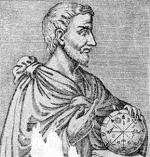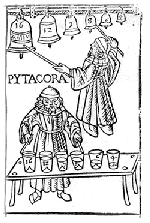Excerpts from the book
From the Introduction
Of all the founders of the Western tradition, Pythagoras is, perhaps, the least well known. This is unfortunate, for understanding Pythagoras and the role his thought plays in our lives is of much more than purely historical interest. Appreciating the influence of this first scientist and philosopher is essential if we are to get beyond a superficial understanding of our intellectual origins.
Pythagoras stands at the fountainhead of our culture. The ideas he set in motion were, according to Daniel Boorstin, “among the most potent in modern history,” resulting directly in many of the pillars upon which the modern world is built. In particular, the very existence of science becomes possible only when it is realized that inner, purely subjective, mathematical forms have a resonance with the form and behavior of the external world—a Pythagorean perception. And a world at peace—that is to say, in a nuclear age, the survival of our planet—is predicated upon ideas of universal brotherhood to which Pythagoras, while not the sole author, made an enormous contribution. Even the seeming remoteness of Pythagorean teaching helps one to realize that the current world view, while it seems destined to dominate the planet, is fleeting and temporary and, like others before it, will pass.

A typical tendency of contemporary readers is to regard Pythagoras, at best, as a mere historical oddity whose ideas have little practical relevance; at worst, as William Irwin Thompson puts it, as “a shamanistic madman from the cults of the Near East.” Recent scholarship by such figures as Erich Neumann and Ken Wilber, however, propose an evolutionary shape for the history of ideas following the underlying unfoldment of internal archetypes of consciousness. Such a context suggests that Pythagoras’ teachings have enormous relevance in understanding both the sources of our culture and, perhaps more importantly, where it may be heading or may need to head. But to appreciate this we have to understand him in modern terms.
Pythagoras is sometimes described in histories of philosophy as a man who had two separate identities: a religious reformer who taught the doctrine of transmigration and instituted a cult society; and a man of science who did much to lay the foundations of mathematics, that is to say of arithmetic, geometry, astronomy and music. But his vision is unitary. Pythagoras does not keep his thought in two separate compartments, one for weekdays the other for Sundays.....
From chapter five: Temples of Egypt and Babylon
Pythagoras' plan to learn from the priests of Egypt was difficult to accomplish. Before him no Greek but Thales had been admitted to their schools, and even he had not been initiated into their mysteries. Pythagoras went first to the court of Amasis in Heliopolis, in the northern part of the Nile valley, where he presented the letter of introduction he had secured in Samos. He was warmly received by the Pharaoh, who, in addition to being indebted to Polycrates, was an admirer of Greek culture. Amasis had made lavish gifts to a number of Hellenic sanctuaries, including the temple of Apollo at Delphi, which he helped to rebuild after its destruction by fire. Impressed by the speech and bearing of the young scholar, the Pharaoh provided him with the documents necessary to be admitted to the priestly schools.
At this time, the scientific and religious knowledge of Egypt was preserved at four centers—Heliopolis, Memphis, Hermopolis and Thebes—each with its own distinctive traditions. Following the recommendation of Amasis, Pythagoras called first upon the priests of Heliopolis. Sworn to protect their ancestral teachings, the priests there sent him southward to Memphis, on the pretense that the temple schools there were more ancient and authoritative. Using the same explanation, the priests at Memphis directed him further up the Nile valley to Thebes.

Fearing the anger of Amasis, the priests at Thebes accepted Pythagoras. Before initiating him, however, they imposed upon him extremely harsh disciplines, expecting that this would persuade him to abandon his purpose. He was assigned a strict program of study, service to the temple, fasting, and other ascetic hardships—a program that far exceeded the demands placed upon other applicants to the priesthood. These tasks he performed so readily and exactly that he at last succeeded in winning their respect. He was initiated, and invited to live among them, sacrifice to their gods and study their sciences. No foreigner had ever been granted such extensive privileges.....
From Chapter Sixteen: Magic and Miracles
Ancient writers are nearly unanimous in recording that Pythagoras performed miracles. In evaluating the truth of these sources we are perhaps best advised to follow the practice of Pythagoras himself, who taught his followers to receive with an open mind reports of supernatural events, to be receptive to unorthodox scientific and sacred theories, and to accept as true many stories considered by others as mythological. To the Pythagoreans all such things seemed credible, and worthy of study and experimentation.
If we are to credit, then, in a similar manner, what serious writers related in the generations following Pythagoras, we should accept that he exerted a powerful influence over animals. He once approached a bear who had caused havoc in the region of Daunia, destroying property and severely injuring a number of people. After approaching it and stroking it gently, feeding it from his hands on maize and acorns, he compelled it by an oath to leave all living beings alone and sent it away. The bear retreated to the mountains and forest, and was never again known to injure any person or animal. Similarly, in the town of Tarentum he observed an ox in a pasture feeding on green beans. He advised the herdsman to tell his ox that it would be better if he ate other kinds of food. The herdsman laughed, remarking he did not know the language of oxen, but if Pythagoras did, he was welcome to tell him so himself. Pythagoras approached the ox and whispered into its ear for a long time. The ox never again ate beans, and lived to a very old age near the temple of Hera in Tarentum, where he was treated as sacred.
One year, when Pythagoras traveled to Olympia for the athletic games, he met with a group of friends and fell into a discussion of prophecies, omens, and divine signs. He took the position that men of piety continually receive messages from the gods if they but attune themselves to their calling.....
From Chapter Nine: Knowledge

Pythagoras was the first to use the word philosophy—the love of wisdom, the science of truth. To illustrate its nature, he used the metaphor of a crowd gathered together for a public event. Here one will find some people driven by the desire to buy and sell, some making a display of their physical strength or appearance, and some busy advancing themselves through self-promotion. Others occupy themselves by observing these people and the landscape that surrounds them, comprehending their patterns, motions and beauty. So it is, he taught, in daily life. Some seek wealth, some power and admiration, and some fame. But the wisest are those who pursue knowledge, and these people he called philosophers.
Central to Pythagoras' concept of knowledge was the distinction he made between appearance and reality. The visible world, he taught, is made of indeterminate forms that arise and decay without ever truly existing.....
From Chapter twelve: Mathematics
For Pythagoras, mathematics served as a bridge between the visible and invisible worlds. He pursued the discipline of mathematics not only as a way of understanding and manipulating nature, but also as a means of turning the mind away from the physical world, which he held to be transitory and unreal, and leading it to the contemplation of eternal and truly existing things that never vary.

He taught his students that by focusing on the elements of mathematics, they could calm and purify the mind, and ultimately, through disciplined effort, experience true happiness.
He held that the ultimate substances of all things, material and immaterial, were numbers, which had two distinct and complimentary aspects. On the one hand, they had a spatial and dynamic existence, and, on the other, they were fundamental formulating principles which were purely abstract.....
From Chapter thirteen: Music
Pythagoras taught that music should never be approached simply as a form of entertainment. Rather, he recognized that music was an expression of harmonia, the divine principle that brings order to chaos and discord, and holds all things in their proper relationships. As such, music has a dual value. Like mathematics, it enables men and women to see into the fundamental structures of nature. But further, if utilized correctly, it can bring the faculties of the soul into harmony with these structures, composing and purifying the mind and body, and thus restoring and maintaining perfect health.....
